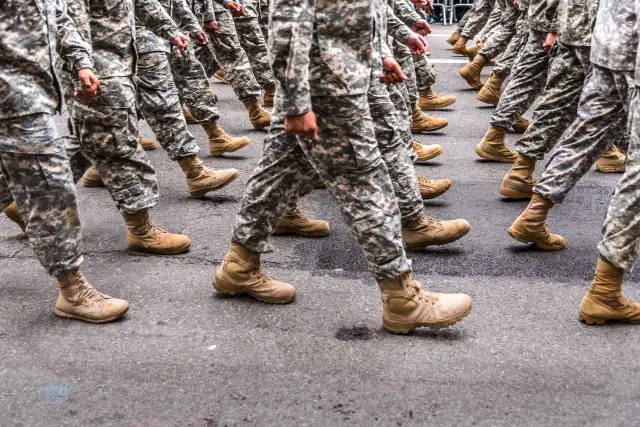Unfortunately, having a criminal record can be very problematic. Your criminal history will follow you for the rest of your life. You’ll find that it is going to be harder to join the military while having a criminal record. Nevertheless, you may be able to bypass this problem. Whether or not you can depends on your age and the details of the offense. Below, you’ll learn more about joining the military with a criminal record and getting a criminal record waiver military.

Department Of Defense Moral Standards
The Department of Defense uses a group of criteria when offering criminal record waivers. In addition to this, the agency has a list of offenses that will never be waived. The good news is that many misdemeanors and felonies can be waived. However, there are certain crimes that will never be waived by the Department of Defense. If you’re currently released on parole or bond, you won’t be able to enter the military. Also, there are certain violent offenses that will never be waived.
If you have a criminal record, you’ll need to determine whether or not you can receive a criminal record waiver.
What Is Never Waived?
Unfortunately, some criminal offenses will never be waived. This means that you’ll likely never be able to join the military. Certain financial misconduct cannot be waived. Some violent offenses and drug trafficking charges cannot be waved either. Furthermore, you’ll need to worry about pre-trail restraints. If you’re waiting for your trial and have been released on bond, you cannot receive a waiver. Also, people on parole will not receive a criminal record waiver.
Either way, you should know that military waivers are handled on a case-by-case basis. You’ll need to submit the necessary information to the recruiter and let them decide. You shouldn’t count yourself out because there is always a chance that you’ll receive a waiver.
Current Need Matters
When you’ve been arrested for a felony, you’re likely worried that you’ll never be able to join the military. You’re worried that you won’t be able to obtain a criminal record waiver. Well, this may or may not be the case. Ultimately, it depends on the current needs of the Army, Air Force, Marines, and Navy. Are they desperately searching for recruits? If they’re having a hard time recruiting new soldiers, you’ll have a better chance of getting a waiver. If recruitment numbers are through the roof, your chances of getting a waiver will be much lower.
You also have to understand that it will depend on the military branch you’re dealing with. Some branches are stricter than others. A 2008 report indicated that the army and marines were more likely to give waivers to felons than other branches. With this in mind, it is a good idea to apply to these military branches if you have a felony on your record.
What The Report Showed
The 2008 report was eye-opening, to say the least. It found that the United States Army had allowed more than 100 convicted burglars to enlist in the army in 2007. During the prior year, it has only allowed 36 convicted burglars to sign up. In 2007, 130 people who had been convicted of drug possession charges other than marijuana were allowed to enlist. The number was much higher than that of the previous year. Two others were able to enlist although they had records of making a bomb or terrorist threats.
It can be difficult to know whether or not you’re going to get a waiver. With this in mind, you should try it out for yourself. You may get a waiver but you may not. The only way to find out is to work with a recruiter.
Criminal Disqualifying Offenses

Is your dream to join the military. Everyone knows a military career is one of the most rewarding because it entails national security. When someone makes the decision to enlist in the military, no one will ever convince them differently. And, why would they?
The military enlistment process has a broad range of eligibility requirements, all of which you must meet. For example, all applicants are required to pass a background check. While this eligibility requirement does not pose an issue for most applicants, it can create a mess for someone with a criminal offense or offenses on their record.
Some criminal offenses are forgivable while others will render an enlistment denial. Minor non-traffic and level-300 misconduct 0ffenses will not keep you from enlisting in the military. However, multiple minor non-traffic or level-300 misconduct offenses may prevent you from making your military dream a reality.
Anyone with at least five minor non-traffic offenses on their criminal record will be disqualified from enlisting in the military. It is possible to fight a denial response related to five or more of these minor offenses. One way is through a moral waiver, a military action that overrules disqualifying criminal offenses.
Domestic abuse is generally enough to keep you out of the military. But, again, it is possible to fight this offense through a moral waiver. So, anything is possible as long as your criminal offenses are minor and only a few.
Military Moral Waiver Process
Military waivers can take anywhere between two and six weeks to process. The approval process varies depending on the type of waiver, when the waiver was submitted, and the responsible agency. The military is one government agency that is not known for a speedy approval process. In fact, the entity is more notable for dragging out these processes. Being prepared in advance will definitely play in your favor when you are still waiting on a response after four weeks of the initial request.
Moral waivers are extremely difficult to get approved. The first step of the process is convincing a military recruiter to file a moral waiver on your behalf. Only the chain of command can approve a moral waiver.
Tips For Enlisting In The Military

When enlisting in the military, you need to be honest and straightforward. You cannot lie about your criminal history because the army is going to find out about it sooner or later. Even if you don’t have a criminal record, the military is going to get check your background.
When you apply, you will be required to submit to an upcoming background check. The recruiter will want to know more about your past legal issues. On the application, you’ll be asked if you’ve been charged, cited, arrested, fined, or held in custody by a law enforcement official.
You may want to lie about it but you shouldn’t. Doing so will only make matters worse in the long run.
Fraudulent Enlistment
You may decide to lie on your application. You might get away with it for a few months, but the military is going to find out at some point. In addition to this, you have to understand that you’re going to be punished severely for lying. Fraudulent enlistment falls under Article 83 of the Government’s Uniform Code of Military Justice. This statute says that fraudulent enlistment can be punished by dishonorable discharge as well as a maximum of 2 years of confinement. Is it worth it?
You never know when the government is going to find out about your deception. When it happens, there is a risk that you’re going to be dishonorably discharged. Even worse is that you could get one or two years of confinement. It is best, to be honest when applying to join the military.
Joining The Military With A Criminal Record
Ultimately, you shouldn’t be afraid of your criminal record. You can’t erase the past. Instead, you’ll need to embrace your mistakes and change for the better. Depending on your crimes, you may be able to join the military despite having a criminal record. During the recruitment process, you’ll want to be honest and open.
You should never lie to the recruiter because doing so will come back to haunt you in the near future. If you’ve had any contact with law enforcement, you need to tell the recruiter about it. Don’t hide anything from this individual. Even if the charge has been dropped, sealed, or expunged, you should tell them about it.
It isn’t safe to hide something that has been expunged. You’ll also need to present as much supporting evidence as possible. Before sitting down with a recruiter, make sure you have this evidence. Be willing to tell the recruiter what happened and what you’ve done to fix the problem. As long as you’re open and honest, you can likely get a waiver and begin serving your country.
How To Get A Military Waiver
Criminal history or moral waivers are commonly issued to individuals attempting to join the military. Nevertheless, you have to understand that waivers are issued depending on the current needs of the military. When the military needs more people, it’ll be easy to get a waiver. If they don’t need people, it’ll be very difficult. Since you need a waiver, you are ineligible to join the military. You’ve requesting the military to make an exception and overlook your prior criminal history. Sadly, you cannot start a request for a moral waiver.
Instead, the recruiter will need to do this for you. There is no right to have your moral waiver processed either. If the recruiter believes you have a slim chance of getting the waiver approved, they likely won’t waste their time asking for one. You’ll need to find a recruiter willing to work hard for you.
FAQs on Criminal Record Waiver Military

How Do I Get A Military Waiver For Criminal Record?
To get a military waiver for your criminal record, you’ll need to work with a recruiter. Your recruiter will need to request the waiver.
Can You Get In The Army With Criminal Record?
Yes. However, it will depend on the type of criminal record you have. Speak to your recruiter so they can request a military waiver for you.
Can The Military Clear Your Criminal Record?
The military will not clear your criminal record. However, they make an exception and let you enlist despite having a criminal record.
What Crimes Disqualify You From The Military?
Felony offenses, domestic violence, and minor non-traffic offenses of five or more. It is possible to overturn enlistment denial requests associated with domestic violence and multiple minor non-traffic offenses.
How Long Do Waivers Take Military?
Moral military waivers take between six and eight weeks to process.

